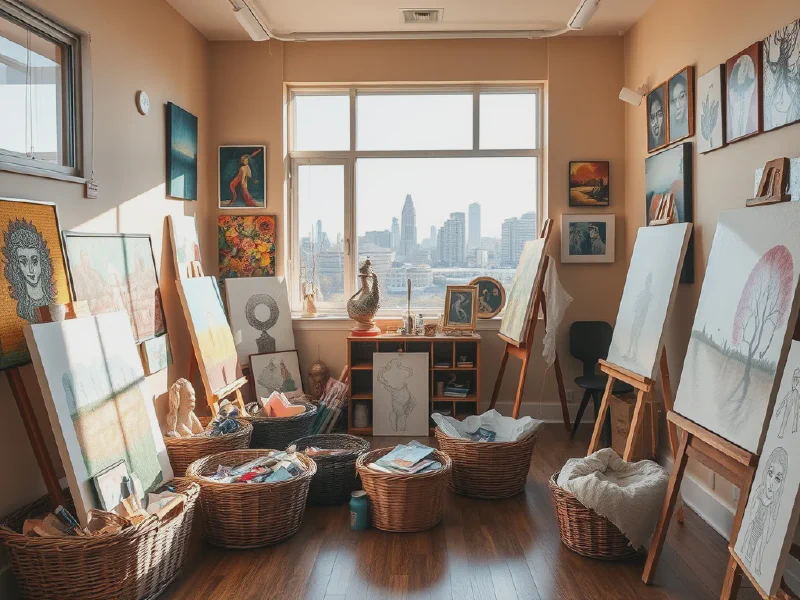Exploring Art Therapy in Addiction Recovery in Cleveland

Art Therapy in Addiction Recovery in Cleveland
Art therapy in addiction recovery in Cleveland offers a unique and enriching approach to healing. By integrating creative processes with therapeutic practices, individuals struggling with addiction can explore their emotions, develop coping skills, and foster self-awareness. This method allows for the expression of feelings that might be difficult to articulate through words, providing a safe and supportive outlet for recovery.
Cleveland has emerged as a hub for innovative treatment strategies, and art therapy is gaining popularity among both therapists and clients. The integration of art in addiction recovery facilitates a holistic healing process, allowing individuals to tap into their creativity for personal insights and breakthroughs. With a focus on rehabilitation that encompasses mental, emotional, and physical health, art therapy in Cleveland is transforming lives.
Art therapy plays a crucial role in healing, as highlighted in this insightful article on supporting addiction recovery through art therapy: https://www.adler.edu/2021/07/06/supporting-addiction-recovery-through-art-therapy/.
Many treatment facilities in Cleveland incorporate art therapy as part of their recovery programs. These sessions can take various forms, including painting, drawing, sculpture, and other artistic activities that help clients engage with their experiences in a meaningful way. Such creative outlets have proven particularly effective in helping individuals navigate the complex emotions associated with addiction, ultimately leading to healthier coping mechanisms and a greater understanding of oneself.
Reports from participants indicate that engaging in art therapy not only aids in the recovery process but also enhances overall well-being. It provides an avenue for connection among peers, fostering community while reducing feelings of isolation. Through collaboration in artistic endeavors, individuals can share their narratives, celebrate milestones, and empower one another as they navigate the landscape of recovery together.
As the field of art therapy continues to evolve, more resources and support systems in Cleveland are focusing on incorporating the arts into addiction treatment. This growing recognition of the value of art therapy underscores the importance of creative approaches in fostering resilience and long-term recovery.
Benefits of Art Therapy in Addiction Recovery
One of the primary benefits of art therapy in addiction recovery is emotional expression through art. Individuals often find it challenging to articulate their feelings verbally; conversely, art provides a nonverbal platform for expressing complex emotions. This process can lead to catharsis and emotional release, which are vital components of healing.
Building self-esteem via creative processes is another significant benefit of art therapy. Completing an artwork allows individuals to gain a sense of accomplishment and pride, which can be particularly beneficial for those struggling with self-worth due to addiction. This boost in self-esteem contributes positively to their overall recovery journey.
Coping skills development through artistic activities is also crucial. Participants learn to channel their thoughts and feelings into creative outlets, thereby fostering healthier responses to stress and triggers. Art therapy empowers individuals with critical skills that promote resilience and self-regulation during challenging times.
Techniques Used in Art Therapy
Painting as a therapeutic outlet is one of the widely practised techniques in art therapy. It allows individuals to immerse themselves in colors and textures, creating pieces that reflect their emotional state or tell a visual story about their experiences with addiction.
Sculpture for tactile exploration serves as another effective technique in art therapy. Manipulating clay or other materials provides a hands-on experience that can be grounding and meditative, allowing individuals to express their feelings through both form and structure.
Drawing to facilitate communication is a valuable technique in art therapy. Through sketching, clients can communicate feelings that may be hard to convey verbally, often revealing deeper insights into their experiences and emotions that require exploration.
Local Resources for Art Therapy
Cleveland is home to various institutions offering art therapy, contributing to a rich tapestry of support for individuals in recovery. Numerous rehabilitation centers integrate art therapy into their treatment programs, combining traditional therapeutic approaches with creative activities.
Support groups integrating art therapy are becoming increasingly prevalent in Cleveland. These groups not only provide a safe space for individuals to share their struggles with addiction but also encourage creativity and collaboration among members, enhancing their recovery journeys.
Art therapy workshops and events in Cleveland serve as valuable resources for both recovering individuals and professionals. These workshops often facilitate community involvement and provide opportunities for participants to learn new artistic skills while engaging in the therapeutic process.
Case Studies of Success
Individual stories of recovery through art highlight the transformative power of creative expression. Many individuals have reported significant breakthroughs during their art therapy sessions, leading to a deeper understanding of their addiction and effective strategies for managing their recovery.
Group therapy sessions focusing on art have fostered a strong sense of community among participants. Sharing creative endeavors allows individuals to bond over shared experiences, thus reducing feelings of isolation and loneliness often associated with addiction.
Long-term benefits observed in participants of art therapy programs in Cleveland include improved mental health, sustained recovery, and enhanced life skills. Many individuals continue to pursue artistic activities even after completing their rehabilitation programs, demonstrating the lasting impact of this healing approach.
Challenges and Considerations
Overcoming stigma associated with addiction and therapy is a challenge that many individuals face. It is crucial for communities in Cleveland to foster understanding and acceptance surrounding the use of art therapy as a legitimate form of treatment.
Access to art supplies and materials can also pose a barrier to effective art therapy sessions. Ensuring that participants have access to essential materials is vital for maximizing the benefits of the creative process.
Finding qualified art therapists in Cleveland can be a consideration for individuals seeking this form of therapy. It is paramount that clients connect with trained professionals who understand the unique needs and challenges faced by individuals in recovery.